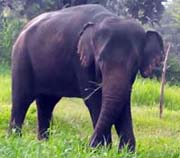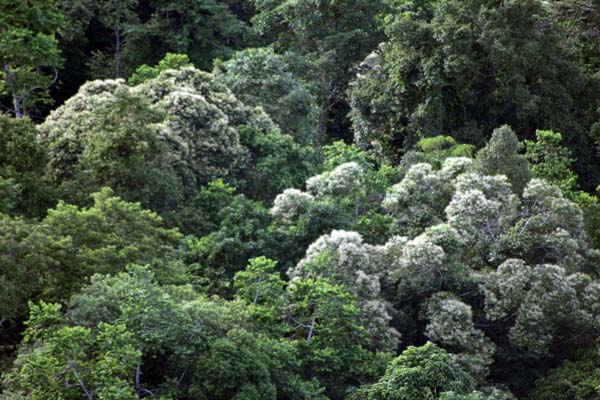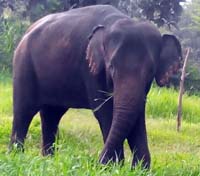
After a 3 year campaign to bring the company to justice, Indonesia’s supreme court in Jakarta finally brought an end to the historic case against palm oil company PT Kallista Alam by rejecting its appeal. The rejection upholds an earlier decision by the National Court in Meulaboh, Aceh, on 8th January 2014, in a case brought against the company by Indonesia’s then Ministry of the Environment, ordering the company to pay IDR 366 billion (approximately USD26 million) for illegally burning forests within the Tripa Peat Swamps, part of the protected Leuser Ecosystem in Sumatra, Indonesia
On 27th November 2012, PT Kallista Alam was first charged by the Ministry of the Environment in the National Court in Meulaboh, Aceh, with illegally burning forests within the Tripa Peat Swamps. The judge found the company guilty in January 2014 and ordered the company to pay IDR 114.3 billion as compensation to the state and to spend IDR 251.7 billion on fully restoring the affected forests back to their original condition. According to the Senior Judge in Meulaboh, Rahmawati SH, PT Kallista Alam was found in breach of National Law No 32/2009 on Environmental Protection and Management, for illegal use of fire to clear forests. The court also confiscated 57 km2 of PT Kallista Alam concession land in Tripa in lieu of payment and for each day payment is not forthcoming ordered the company to pay an additional Rp. 5,000,000 (approx. USD 400).

An overview of the Leuser Ecosystem forest-the only place in the world where Sumatran orangutans, tigers, elephants and rhinos can be found living side by side. (Photo: Scorpion)

Elephant. (Photo:Scorpion)

Rhino. (Photo: Wikipedia)

Orangutan. (Photo: Scorpion)

Tiger. (Photo: Scorpion)
Appeals rejected.
The Meulaboh court’s decision was appealed by the company at the High Court in the provincial capital of Banda Aceh (appeal lodged May 14th 2014), but that appeal was rejected on 15th August 2014, prompting the company to lodge a second and final appeal on 6th October 2014 with Indonesia’s Supreme Court in Jakarta. Finally, on 28th August the supreme court rejected the appeal, ordering PT Kallista Alam to now face the penalty imposed by the earlier ruling.
The rejection of the appeal effectively brings to an end the lengthy civil legal case first lodged on 27th November 2012 in Meulaboh, but it has additional ramifications too. In parallel criminal cases against the company’s Director and Development Manager, prison terms were handed out on 15th July 2014 of 8 months and 3-years respectively, as well as additional fines.
Implementation of these sentences is believed to have been pending the appeal of the civil case with the Supreme Court, and presumably must now be enforced with the recent rejection of that appeal.
International outcry
PT Kallista Alam, first came to international attention in August 2011, when the former Governor of Aceh Province, Irwandi Yusuf, issued a new 1,605ha oil palm concession permit to the company in the Tripa peat swamp forests within the legally protected Leuser Ecosystem, sparking an international outcry. Acehnese environmentalists immediately sued the Governor and the company over the illegal permit, finally achieving its cancellation on 27th September 2012. In the meantime, huge fires ravaged Tripa’s peat swamp forests, within plantation concessions held not only by PT Kallista Alam but also a number of other companies too. As a result of these fires, Tripa was once again thrust into the international spotlight and a number of new legal cases were brought against the companies by Indonesia’s Ministry of Environment.
Tripa is part of the 2.6 million ha protected Leuser Ecosystem, the only place in the world were Sumatran orangutans, tigers, elephants and rhinos can be found living side by side.
The Leuser Ecosystem was also listed by the World Conservation Union (IUCN) in November 2013 as one of the ‘World’s Most Irreplaceable Protected Areas’ in an article in the journal Science. Tripa is especially important for its orangutans, since it harbours among the highest orangutan densities in the world. The peat swamps also sequester huge amounts of carbon, which is released into the atmosphere when the forests and peat are cleared and burned, fuelling global climate change.
Due to the global significance of the area concerned, over 1.5 million people signed online petitions calling for greater protection of Aceh’s unique and extremely important forests. These petitions were further supported by some of the world’s leading scientists and conservation experts, who wrote to Aceh’s current Governor, Zaini Abdullah, urging him to nominate the Leuser Ecosystem as a World Heritage Site, due to its unique and irreplaceable biodiversity.
Rudi Putra, a leading Acehnese conservationist and Founder of the Leuser Conservation Forum (FKL) explained, “The campaign behind this successful case has involved multiple NGOs and communities working together and never letting up the pressure over 3 years. This win would never have been possible without the national and international public support the case has had from people who wouldn't accept this heinous destruction, who have monitored the legal process from the start and who have kept up the pressure for a just and transparent result. We want to thank everyone who made this positive and extremely welcome final decision possible.”
Mr T.M Zulfikar, who brought the first legal challenge against Kallista Alam’s illegal permit and now represents the Indonesian NGO Yayasan Ekosistem Lestari noted, “It has taken 3 long years but we are overjoyed to finally see PT Kallista Alam held to account for its wanton destruction of the Tripa Peat Swamp forests. No financial penalty can ever make up for the devastation and terrible loss of biodiversity caused by the company but we applaud the supreme court for holding it accountable for its actions. The initial ruling in Meulaboh, and now the supreme court’s rejection of the appeal, should send a strong warning to other companies that illegal clearing of forests in the protected Leuser Ecosystem will not be tolerated. We will also be monitoring closely what happens next to ensure the fines and reparations are indeed paid and carried out in full, including the restoration of the affected concession to its former condition.”
Kamaruddin, a lawyer working with communities in the Tripa region reiterated, “This decision should serve as a wake up call to any company thinking of investing within the Leuser Ecosystem, a National Strategic Area, that they could suffer the same fate as PT Kallista Alam.
It should be a reminder to others as well, who deliberately burn forests or allow forest burning within their concessions, that they could also be prosecuted, regardless of whether or not they are working inside the Leuser Ecosystem’s boundaries. The Judge’s decision in this case clearly illustrates a move towards improved law enforcement against environmental offenders in the region”, he added.
Dr Ian Singleton, Director of the Sumatran Orangutan Conservation Programme, highlighted the critical importance of the area, “Tripa is one of only 3 remaining peat swamp forests left containing orangutans in Sumatra and it's impossible to overstate the importance of protecting every last hectare of each of them. Orangutan densities can reach as high as 8 per square kilometer in these areas, compared to an average of around only 1 or 2 per square kilometer in dryland forests. These peat swamps have justifiably been referred to as the ‘orangutan capital of the world’. The Leuser Ecosystem too, offers the only real hope of survival for Sumatra’s other key iconic megafauna, the Sumatran tiger, rhino and elephant, as well as its orangutans.
Yesterday’s ruling is of course extremely welcome, but the level of interest in Tripa and the Leuser Ecosystem worldwide shows clearly just how seriously concerned the international community is right now about the fate of these forests and their globally important biodiversity”, he emphasised.
Farwiza Farhan of Forest, Nature and Environment Aceh (HAkA) stressed, “Whilst of course we welcome this historic ruling we need to remain extremely vigilant. Aceh’s unique forests and the globally important Leuser Ecosystem are still under immense threat due to the province’s spatial land use plan, which even more than 18 months after it was ratified by Aceh’s Provincial Government, is still rejected by Indonesia’s National Government due to numerous legal infringements. The plan makes no mention whatsoever of the existence of the Leuser Ecosystem National Strategic Area, it effectively legalizes numerous illegal roads, many of which have already been cut through the forests, and it opens up vast areas for potential new, timber, mining and plantation concessions. Despite the win against PT Kallista Alam in Tripa, we still have a much more desperate and urgent fight ahead of us to protect Aceh’s forests and people from another, major, and totally avoidable emerging disaster.”
ENDS
Contacts:
Farwiza Farhan; Founder, HAkA (Forest Nature and Environment Aceh). Tel : +62-821-
62610756, Email : farwiza@gmail.com
Dr Ian Singleton; Director, Sumatran Orangutan Conservation Programme. Tel : +62 -811-
650491, Email : mokko123@gmail.com
Kamaruddin; Lawyer for Communities in Tripa. Tel : +62 811 6700118, Email :
kamaruddinaceh@yahoo.co.id
Rudi Putra; Founder, Forum Konservasi Leuser. Tel : +62 0812 6435929, Email :
rhinoleuser@gmail.com
T.M. Zulfikar, Aceh representative, Yayasan Ekosistem Lestari. Tel : +62 812 6901283,
Email : tmzulfikar@yahoo.com